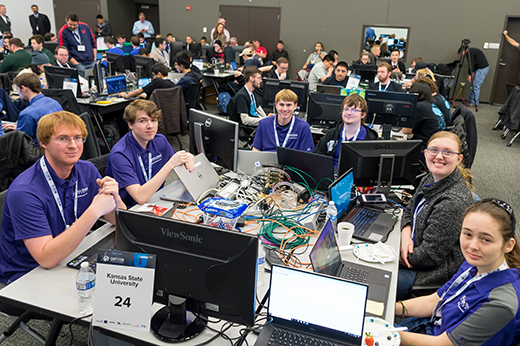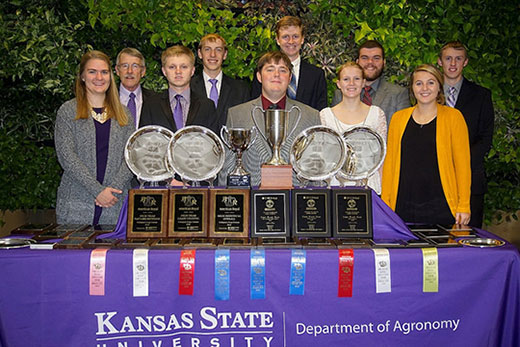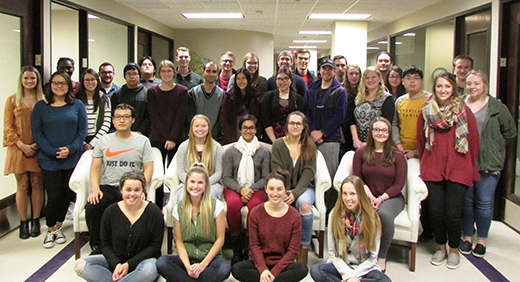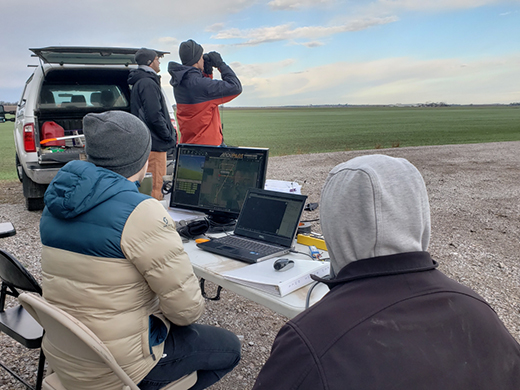12/12/18
K-State Current - December 12, 2018
K-State Current is a weekly news update for the Kansas Board of Regents to apprise the Regents on a few of the many successes and achievements made by K-State faculty, staff and students.
K-State News
Students studying unmanned aircraft systems at the Kansas State University Polytechnic Campus are receiving a rare flight experience in some of their courses that is positioning them at the forefront of the drone industry.
Kansas State Polytechnic's UAS flight and operations degree option is the first in the nation to introduce flying beyond visual line of sight into college curriculum. The campus has been granted a waiver from the Federal Aviation Administration to perform this type of unmanned operation. Currently restricted under federal regulations, only a handful of organizations in the United States have been authorized to fly UAS out of visual sight, with Kansas State Polytechnic receiving the first such waiver to a university by the FAA.
"It is a significant opportunity for our students to learn how to fly UAS beyond their visual line of sight because they are preparing their skills and knowledge for the future of the industry," said Kurt Carraway, UAS executive director of the Applied Aviation Research Center at Kansas State Polytechnic. "They also have a distinct advantage over their peers at other schools who don't have the authorization to do this yet, making them more marketable when they are ready to start their career."
This fall, two upper-division courses — Advanced Fixed Wing Operations and Flight and Field Operations — incorporated beyond visual line of sight into their flight labs. Considered a higher-risk operation, students' attention to detail and to safety were dramatically elevated.
"They first had to review the FAA waiver and understand how to fully comply with its specific requirements," said Travis Balthazor, flight operations manager of the Applied Aviation Research Center at Kansas State Polytechnic. "Students also learned new aspects of mission planning and how to best mitigate risk in the field, including using ADS-B software, which monitors other aircraft in their flight area."
In beyond visual line of sight, UAS are not flown manually, but instead by a ground control station linked to an autopilot system on the drone. In addition to training on these advanced technologies, students also had to learn about the behaviors of the entire unmanned system in a variety of scenarios in order to maintain control of the aircraft if any issues arise.
"In the long run, flying unmanned aircraft beyond visual line of sight is more practical and more efficient, so you're going to see operations like Amazon package delivery, mapping large quantities of farmland or inspecting several miles of power lines become more prevalent as regulations evolve," said Kurtis Liles, senior in UAS flight and operations, Wichita. "I'm proud to be a part of a program that already has the ability to perform this type of operation, and I'm excited to see how I can utilize my experiences in the industry after graduation."
The beyond visual line of sight waiver was first granted by the FAA to Kansas State Polytechnic's Applied Aviation Research Center this summer before being integrated into the UAS degree curriculum. Additionally, the campus has a waiver from the FAA to perform unmanned flight operations at night, which also has been added to several UAS courses.
High-tech startup and KSU-IC affiliate HitchPin named ag innovation award finalist
A technology startup receiving assistance from the Kansas State University Institute for Commercialization, or KSU-IC, is a finalist for a national innovation award.
HitchPin is a finalist in the Farm Credit Services of America Ag Innovation Pitch Competition, which takes place Wednesday, Dec. 5. The competition's six finalists will present during the 2018 Nebraska Power Farming Show. A $20,000 grand prize and a $5,000 People's Choice Award are up for grabs.
The KSU-IC houses HitchPin's headquarters and many of its employees, and has invested in the company.
"HitchPin demonstrates the kind of innovation that supports economic growth and the largest industry in Kansas," said Kent Glasscock, president of KSU-IC. "The company shows that Manhattan is on par with any location in the world in terms of high-tech business opportunities."
Hitch pins connect tractors to machinery and are critical to getting work done on the farm. The technology startup HitchPin is providing a new kind of connection for farmers.
"What we're doing is similar to Airbnb or Uber, only for agricultural products and services," said Trevor McKeeman, CEO and founder of the company.
McKeeman grew up farming in Dickinson County north of Abilene and graduated from K-State and the Massachusetts Institute of Technology with business degrees. His company's app helps farmers hire a harvest crew or purchase hay. Farmers can also post their own services or products to sell. This approach helps solve persistent problems presented by complex logistics in agriculture.
McKeeman said he has found a vibrant innovation ecosystem in Manhattan through connections with Kansas State University and KSU-IC.
"Being affiliated with a top-tier ag and engineering university is a tremendous advantage for talent and innovation," McKeeman said. "Some of the brightest minds are working on globally relevant projects here. The capabilities and strong work ethic are incredible."
K-State Faculty Highlights
Art department professor awarded residency at Asia Cultural Center in South Korea
Carlos Castellanos, assistant professor in the art department's digital/experimental media program, has been awarded a residency at the Asia Cultural Center in Gwangju, South Korea.
In partnership with the International Symposium on Electronic Art, or ISEA2019, the global residency program for media artists addresses the theme of ISEA2019, "Lux Aeterna (Eternal Light)," along with its four subthemes: "Aeternitas," "Symphonia," "Illuminatio" and "Penumbra."
The residency will focus on the development of a human-plant communication system. Along with artist and former digital/experimental media student Bello Bello, Castellanos will build a system that measures the photosynthetic and bioelectrical activity from an array of plant microbial fuel cells, or P-MFCs, and translate the data into light and sound patterns using machine learning. Bioelectricity, light, sound, CO2, photosynthesis and computational intelligence form a circuit that enhances informational linkages between human, plant, bacteria and the physical environment. This enables a mode of interaction that is experienced not just as a technologically enabled act of translation but as an embodied flow of information.
The research will culminate in a public demonstration and exhibition during the week of the festival, June 22-28, 2019.
Jordan inducted into Kansas Athletic Trainers' Society's Hall of Fame
Shawna Jordan, assistant dean in the College of Human Ecology, was recently inducted into the Kansas Athletic Trainers' Society's Hall of Fame.
Jordan, along with fellow inductee, Amy Cahill, are the first women inducted into the Hall of Fame, which is dedicated to the pioneers of the profession in the state of Kansas who have served the profession, their patients, workplaces and that state with distinction.
As a member of the society, Jordan has held numerous roles including the Student Leadership Council advisor, symposium committee member and quiz bowl director. She currently serves as the KATS Practice Act task force chair. She has been a representative for the state at the district level, giving presentations and serving in volunteer roles. At the national level, she serves as a Commission on Accreditation of Athletic Training Education site visitor and a reviewer for the National Athletic Trainers' Association Educators' Conference.
Jordan currently serves as assistant dean of student support and assistant professor of athletic training in the College of Human Ecology. She helped to develop the undergraduate athletic training program at K-State and served as the program director for 13 years before moving to the dean's office. She has won numerous awards on campus for her time in athletic training including the Presidential Award for Excellence in Undergraduate Teaching and the Presidential Award for Excellence in Undergraduate Advising.
The Kansas Athletic Trainers' Society was founded in 1980 to advance the profession of athletic training in the state of Kansas. The society is composed of highly skilled health care professionals who are nationally certified and licensed to practice in the state of Kansas to advance, encourage, and improve the profession of athletic training and promote sports health and safety. Its mission is to help assure top quality health care to the physically active in Kansas, and to promote an increased awareness of the profession of athletic training to the citizens of the state of Kansas.
K-State Student News
Cyber Defense Club takes top honors in DOE national cybersecurity competition

A team of Kansas State University computer science students has earned national recognition for its cybersecurity skills.
The Kansas State University Cyber Defense Club took second place in the overall U.S. Department of Energy's 2018 CyberForce Competition nationwide. The students earned first place at the Argonne National Laboratory location where they competed.
The competition included approximately 70 college teams from 24 states and Puerto Rico. The student teams competed at seven national laboratories across the country; the Kansas State University team competed at Argonne National Laboratory.
"I am happy with how we came together as a team and competed alongside some of the most talented students in the country," said BreAnn Anshutz, president of the K-State Cyber Defense Club and senior in computer science, St. John. "The entire team put in a lot of hard work and late nights, truly going above and beyond. The competition included some very unique and clever challenges, and I am immensely proud that we were able to solve them and persevere."
The competition is designed to develop the next generation of cybersecurity professionals to improve the nation's critical energy infrastructure and ensure energy security. It is sponsored by DOE's Office of Cybersecurity, Energy Security, and Emergency Response.
The competition replicated a real-life scenario. During the competition, students defended a simulated oil transportation network, a power delivery system and a high-performance computing system against attacks created by experts from the national labs, the private sector and the National Guard.
"I am extremely proud of our students and their latest success at the CyberForce Competition," said Eugene Vasserman, associate professor of computer science, faculty adviser to the club and director of the Kansas State University Center for Information and Systems Assurance. "The event is more than a competition; it also gives our students the chance to test their knowledge and improve their skills in a real-world scenario. Our students have shown that they can rise to the occasion."
Russell Feldhausen, instructor of computer science, served as faculty mentor during the competition.
The following computer science students competed as part of the K-State Cyber Defense Club:
From Greater Kansas City: Nathanael Hood, junior, Olathe; and Joy Hauser, master's student, and Josh Riess, junior and Cyber Defense Club safety and ethics officer, both from Overland Park.
Hunter Guthrie, senior, Hutchinson; Caleb Fleming, graduate student and team captain, Overbrook; BreAnn Anshutz, senior and Cyber Defense Club president, St. John.
Hauser and Fleming are recipients of the CyberCorps: Scholarship for Service program.
K-State Crops Team wins national championship and sweeps top individual awards

The Kansas State University Crops Team recently captured the title of national champions by winning both the Kansas City American Royal Collegiate Crops Contest on Nov. 13 and the Chicago Collegiate Crops Contest on Nov. 17. K-State teams have now won the collegiate crops contest championship in 16 of the past 20 years. Iowa State University was in second place at both events, and the University of Minnesota-Crookston took third.
Official members of the K-State team were Wes Jennings, Abilene, junior in agronomy; Luke Ryan, Solomon, sophomore in agronomy; and Jayden Meyer, Smith Center, sophomore in agricultural economics. Alternate contestants were agronomy majors Nate Dick, junior, Inman; Noah Winans, junior, Tekonsha, Michigan; Madison Tunnell, sophomore, Olathe; and Blake Kirchhoff, sophomore, Hardy, Nebraska.
In both contests, the K-State team took first place in all three phases of the contest: plant and seed identification, seed analysis and grain grading. In addition, team members swept the 1-2-3 individual overall placings at both events. Such a sweep of all three contest components and the top three individual placings at both contests is very rare and has only been accomplished twice before in the 85-year history of the events, both times by K-State.
At Chicago, Wes Jennings won first place individual overall. He won both the plant and seed identification and seed analysis components and finished second in grain grading. Luke Ryan was second overall, placing second in identification, third in seed analysis and fourth in identification. Jayden Meyer came in third, tied with Ryan for second in identification, and was fourth in seed analysis and seventh in grain grading. Alternate Nate Dick also had a perfect score in grain grading.
At Kansas City, Jayden Meyer was the top individual overall, where he won the grain grading component with a perfect score. He also was first in identification and second in seed analysis. Wes Jennings was second individual overall, placing first in identification, second in seed analysis, and fourth in grain grading. Luke Ryan was tied for third overall, third in identification, sixth in grain grading and eighth in seed analysis. Alternate Blake Kirchhoff scored a perfect in grain grading also.
The team was coached by Kevin Donnelly, K-State professor of agronomy. Keren Duerksen, Newton, and Kaylin Fink, Chapman, seniors in agronomy, were assistant coaches.
In the contests, participants are required to identify 200 plant or seed samples of crops and weeds; grade eight different samples of grain according to Federal Grain Inspection Service standards; and analyze 10 seed samples to determine what contaminants they contain.
The American Royal coordinated the Kansas City contest, with Corteva Agriscience as the primary awards sponsor. Additional sponsors were GFG Ag Services, CHS Foundation, American Society of Agronomy, Association of Official Seed Analysts, and South Dakota Crop Improvement Association.
The primary sponsor of the Chicago contest was the CME Group. Additional donors in Chicago included the Crop Science Society of America, Growmark Cooperative, and the Society of Commercial Seed Technologists.
For its performance, K-State received a team scholarship award from contest sponsors at Kansas City, and CME Group provided individual scholarships to the top five students at Chicago. They will also receive a stipend from the American Society of Agronomy Reinvest Program to attend the Australia Universities Crops Competition in the fall of 2019.
Locally, sponsors for the K-State Crops Team include the Kansas Crop Improvement Association, Department of Agronomy, College of Agriculture, and the K-State Student Government Association.
Undergraduate students selected to join Kansas State University cancer research teams

The Johnson Cancer Research Center at Kansas State University has selected 35 students to participate in its undergraduate research mentoring and award program.
The center's Cancer Research Award program promotes student participation in laboratory research. It encourages undergraduate students to consider careers in cancer research and medicine early on while they are still deciding what academic and professional paths to take.
"This opportunity gets students more engaged in their education, a critical factor in their success," said Stephen K. Chapes, the center's interim director and a professor of biology. "Many of these future cancer researchers and medical workers will undoubtedly go on to be some of the top professionals in their fields."
The award program, which is open to Kansas State University undergraduate students interested in doing cancer-relevant research, provides $1,500 awards to around 35 students a year, and $1,000 per student for research expenses.
Students applied for the awards by co-writing research proposals with faculty mentors affiliated with the center. The awardees conduct their research in the mentors' laboratories during the spring semester.
"These are some of the university's — and the state's — most outstanding science students, working closely with excellent faculty on real research projects," Chapes said.
The students will be recognized in the spring at a banquet attended by their families and faculty mentors, cancer research center supporters and university administrators.
The Johnson Cancer Research Center supports the research and training of affiliated faculty, undergraduate and graduate students and postdoctoral fellows. All programs are funded through private gifts.
The following students received Cancer Research Awards; included is each student's faculty mentor:
Grant Huslig, senior in chemical engineering, Andover, mentored by Robert DeLong, associate professor of anatomy and physiology; Mayme Loyd, sophomore in biochemistry, modern languages and pre-medicine, Bucyrus, mentored by Masaaki Tamura, professor of anatomy and physiology; Joseph Hammer, junior in chemistry, Cherryvale, mentored by Stefan Bossmann, professor of chemistry; Marissa Komp, junior in life science and pre-veterinary medicine, Clearwater, mentored by Jocelyn McDonald, assistant professor of biology; Megan Goeckel, junior in microbiology and pre-medicine, Council Grove, mentored by Greg Finnigan, assistant professor of biochemistry and molecular biophysics; Baltazar Claro-Martinez, senior in biochemistry, Garden City, mentored by John Tomich, professor of biochemistry and molecular biophysics.
From Greater Kansas City: Alexa Wilden, senior in microbiology and pre-medicine, Gardner, mentored by Stella Lee, assistant professor of biology; Ariana Cecil, junior in biology and pre-medicine, Leawood, mentored by Katsura Asano, professor of biology; Sara Hopkins, senior in biology and pre-medicine, Leawood, mentored by Richard Todd, associate professor of plant pathology; Nicole Robben, junior in animal sciences and industry, Leawood, mentored by Masaaki Tamura, professor of anatomy and physiology; Carter Moravek, junior in biology and pre-medicine, Overland Park, mentored by Chingakham Singh, research assistant professor of biology; Samuel Ockerhausen, sophomore in biochemistry and pre-physician assistant, Overland Park, mentored by Jeroen Roelofs, associate professor of biology; and Robert Small, sophomore in biochemistry, Overland Park, mentored by John Tomich, professor of biochemistry and molecular biophysics.
Seth Peery, senior in biochemistry and pre-medicine, Goddard, mentored by Kathrin Schrick, associate professor of biology; Sarah Hansen, senior in nutrition and health, and dietetics, Hutchinson, mentored by Kristin Michel, associate professor of biology; Prerona Kundu, senior in mechanical engineering, Lawrence, mentored by Amir Bahadori, assistant professor of mechanical and nuclear engineering.
From Manhattan: Cesar Aparicio, junior in chemistry, mentored by Santosh Aryal, assistant professor of chemistry; Michelle Coca, senior in biochemistry and pre-medicine, mentored by Maureen Gorman, research associate professor of biochemistry and molecular biophysics; Samantha Gameros, senior in biochemistry and biology, mentored by Erika Geisbrecht, associate professor of biochemistry and molecular biophysics; and Kyle Thompson, junior in nutritional sciences and pre-medicine, mentored by Kathrin Schrick, associate professor of biology.
Jestin Gage Wright, sophomore in chemistry, Rose Hill, mentored by Jun Li, professor of chemistry; Johnathan Dallman, senior in chemistry and pre-medicine, Silver Lake, mentored by Ryan Rafferty, assistant professor of chemistry; Maria Montes-Gonzalez, senior in chemistry, Syracuse, mentored by Stefan Bossmann, professor of chemistry; Joshua Lingo, junior in microbiology and pre-medicine, Tonganoxie, mentored by Jeroen Roelofs, associate professor of biology; Ashley Bartels, sophomore in chemical engineering, Topeka, mentored by Ryan Rafferty, assistant professor of chemistry.
From Wichita: Madelyn Hilgers, sophomore in chemistry and pre-pharmacy, mentored by Chingakham Singh, research assistant professor of biology; Whitney Pepper, sophomore in biology and mathematics, mentored by Katsura Asano, professor of biology; and Haley Smalley, senior in microbiology, mentored by Sherry Fleming, professor of biology.
From out of state: Marlene Campos-Guerrero, senior in microbiology, Kansas City, Missouri, mentored by Zhilong Yang, assistant professor of biology; Nina Marchell, senior in psychology and pre-veterinary medicine, College Station, Texas, mentored by Robert DeLong, professor of anatomy and physiology; and Isabel Lewis, junior in biochemistry and pre-medicine, Helotes, Texas, mentored by Greg Finnigan, assistant professor of biochemistry and molecular biophysics.
From out of country:
Yibo Liu, senior in biology, China, mentored by Ruth Welti, university distinguished professor of biology; Fawwaz Naeem, senior in biology, Iraq, mentored by Erika Geisbrecht, associate professor of biochemistry and molecular biophysics; Hawa Dembele, sophomore in biochemistry, Mali, mentored by Om Prakash, professor of biochemistry and molecular biophysics; and Eric Austin Cheng, senior in biology and pre-medicine, Taiwan, mentored by Zhilong Yang, assistant professor of biology.
